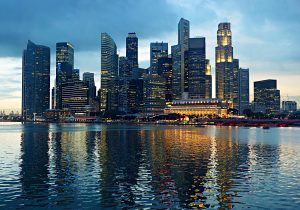Singapore is finally shifting its COVID-19 strategy, joining a number of its Southeast Asian neighbors in transitioning toward “living with” the virus. In a televised address, Prime Minister Lee Hsien Loong announced that Singapore will ease most of its pandemic restrictions, including outdoor mask mandates, starting March 29.
Singapore will lift quarantine requirements for all vaccinated travelers from April 1, joining a number of regional partners – including Malaysia, Indonesia, Thailand, Cambodia, and the Philippines – that have announced or already made such a move. Under the new rules, all fully vaccinated travelers and non-fully vaccinated children aged 12 and below can enter Singapore without needing to apply for entry approvals.
The city-state also dropped its requirements that masks be worn outdoors, and doubled its limits on social gatherings from five to 10 people. “Our fight against COVID-19 has reached a major turning point,” Lee said in his speech. “We will be making a decisive move towards living with COVID-19.” According to Lee, Singapore will remove a 10:30 p.m. curfew on dining and alcohol sales, and allow more employees to return to their workplaces.
Lee also said Singapore will “drastically streamline” testing and quarantine requirements, making travel abroad easier. “Resume more normal lives, enjoy larger gatherings of family and friends, go outdoors without masks, or reunite with loved ones abroad,” Lee said. “But do not throw all caution to the wind.”
Singapore was one of the first Asian countries to plot out a strategy for living with COVID-19, but was forced to put its plans on hold when the Delta variant touched off serious outbreaks across Southeast Asia in mid-2021. Despite achieving an 80 percent vaccination rate in September of last year, the country saw cases spike upward to around 3,000 per day by November, leading the government to keep stringent social and travel restrictions in place.
Numbers have shot up even higher in recent months with the advent of the fast-moving Omicron variant, touching a peak of 26,032 infections on February 22, but the relatively mild and fast-burning nature of the variant, which has led in nations like Indonesia and the Philippines to seen sudden spikes followed by equally rapid drops in case numbers, has led the government to make a decisive shift toward treating COVID-19 as endemic. On Wednesday, Singapore recorded 8,940 cases of the disease.
While life is not fully back to normal – masks will still be needed to be worn indoors, for instance, and the onerous restrictions on the movement of Singapore’s migrant workers will remain in place – it comes as a relief to the many of the city-state’s 5.7 million people, who have faced some of the most onerous mask mandates and restrictions of any nation outside China. “After this major step, we will wait a while to let the situation stabilize,” Lee said in his speech. “If all goes well, we will ease up further.”
































